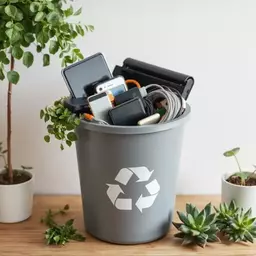Decluttering can be transformative, but it’s not just about tidying up; it’s an opportunity to make conscious decisions that benefit both your life and the planet. By integrating responsible decluttering practices, you can enhance your living space, support your community, and promote sustainability.
What You Will Learn
- Ethical Decluttering: Learn the importance of recycling, donating, and repurposing items to minimize landfill waste.
- Mindfulness: Discover how understanding emotional attachments to belongings can enhance your decluttering journey and promote intentional living.
- Popular Methods: Explore various decluttering approaches, such as the Marie Kondo method, to find a strategy that resonates with you.
- Community Involvement: Understand the significant impact decluttering has on local communities through support of charities and encouragement of sharing resources.
- Practical Steps: Start your decluttering journey with actionable steps, such as beginning with a small area and seeking local recycling and donation resources.
- Upcycling and Secondhand Shopping: Embrace sustainable practices by exploring creative upcycling projects and shopping secondhand to reduce waste.
Key Takeaways for Sustainable Decluttering Practices
Here’s a quick roundup of effective methods and their impact:
Ethical Decluttering
Prioritize recycling, donating, and repurposing items instead of tossing them in the trash.
Mindfulness
Understand your emotional attachments to objects and practice intentional living.
Popular Methods
Explore various decluttering philosophies like the Marie Kondo method to find what resonates with you.
Community Involvement
Engage with local initiatives to share resources and support sustainable practices.
Understanding Responsible Decluttering Practices
Decluttering isn’t just about tidying up; it’s about making choices that reflect our values and support a healthier planet. At Eco Habits Daily, I believe that responsible decluttering can lead to a positive impact not only on our homes but also on our environment and communities. Let’s dive into the importance of ethical decluttering and how we can incorporate mindfulness into our decluttering practices!
The Importance of Ethical Decluttering
When we talk about ethical decluttering, we emphasize the need to consider where our discarded items go. Every item we choose to let go of has the potential for a new life. It’s vital to understand that our choices in decluttering can have ripple effects that go beyond our own households.
Why Responsible Decluttering Matters for the Environment
Responsible decluttering plays a crucial role in reducing waste and conserving resources. By making thoughtful decisions about what we keep and what we let go, we can help minimize landfill overflow. Here are some key reasons why ethical decluttering matters:
- Reduces landfill waste: By donating or recycling items, we’re keeping them out of landfills.
- Conserves natural resources: Proper disposal helps preserve our environment by ensuring materials are reused.
- Promotes sustainability: Choosing eco-friendly disposal methods encourages a culture of responsible consumption.
The Impact of Decluttering on Local Communities
Decluttering can significantly benefit our local communities by providing access to items that others may need. When we donate instead of tossing, we create opportunities for those less fortunate. Additionally, it can foster a sense of community as neighbors share resources and support one another. Here’s how decluttering impacts local communities:
- Supports local charities: Donated items often go to organizations that help those in need.
- Encourages sharing: Creating community swap events can bring people together, promoting a sharing culture.
- Boosts local economies: Donated items can help local thrift stores thrive and provide affordable options for families.
Incorporating Mindfulness in Decluttering
As we begin to declutter our spaces, it’s essential to take a moment to reflect on our emotional attachments to our belongings. Mindfulness can guide us in understanding why we hold onto certain items and how we can let go more easily. Practicing mindful decluttering is not only beneficial for our spaces but also for our mental well-being.
Before we continue, let's address some frequently asked questions about responsible decluttering:
Understanding Emotional Attachment to Items
Many of us find it challenging to part with belongings due to sentimental value. It’s easy to feel tied to items that hold memories or represent our past. By recognizing these attachments, we can make more informed decisions about what to keep and what to release. Here are a few tips for managing emotional attachments:
- Reflect on the purpose: Ask yourself, “Does this item bring me joy or serve a purpose?”
- Document memories: Take photos of sentimental items before letting them go.
- Set limits: Decide on a set amount of space for sentimental items, ensuring you don’t keep everything.
When considering emotional attachments, remember that mindful, eco-friendly living encourages us to evaluate our possessions and their true impact on our lives.
Practicing Intentional Living Through Decluttering
Intentional living is about making conscious choices that align with our values. Decluttering offers a unique opportunity to evaluate our lives and make space for what truly matters. Here are some ways to practice intentional living through decluttering:
- Prioritize essentials: Keep only what’s necessary and meaningful.
- Regularly reassess: Check in with your belongings to see if they still align with your current life.
- Embrace minimalism: Consider adopting a minimalist approach to simplify your life.
Popular Decluttering Methods
There are various methods available to help us declutter effectively. Two popular approaches, the Marie Kondo method and insights from The Minimalists, offer practical strategies that resonate with many. By exploring different techniques, you can find the one that feels right for you and your lifestyle.
The Marie Kondo Method and Its Principles
The Marie Kondo method, also known as the KonMari Method, focuses on keeping items that *spark joy*. It encourages individuals to assess each item based on how it makes them feel. Here’s a quick overview of her principles:
- Commit to decluttering: Approach the process with a mindset of determination.
- Visualize your ideal lifestyle: Picture how you want your space to look and feel.
- Declutter by category: Tackle categories like clothing, books, and sentimental items one at a time.
For those looking for ways to dispose of unwanted items responsibly, an eco-friendly junk removal guide can provide valuable information.
Insights from The Minimalists and Peter Walsh
The Minimalists and Peter Walsh also offer valuable insights into decluttering, emphasizing the benefits of simplifying our lives. They encourage a shift in perspective towards managing possessions. Here are some insights from these thought leaders:
- Focus on experiences over possessions: Value memories and experiences more than material items.
- Question the necessity: Before acquiring something new, ask if it’s truly needed.
- Live with intention: Create a life that reflects your values through mindful consumption.
By understanding these popular decluttering methods, you can choose the one that resonates most with you. Remember, decluttering is a journey, and every step you take contributes to a more sustainable lifestyle. Let’s embrace responsible decluttering together, making a positive impact on our homes and the planet!
Pro Tip
Did you know? One of the most effective ways to approach decluttering is to implement the "One In, One Out" rule. This means that for every new item you bring into your home, you should let go of an existing item. This practice not only helps to maintain a clutter-free environment but also encourages mindful consumption, making you think twice about your purchases.
Summarizing the Principles of Responsible Decluttering
As we wrap up our journey into the world of responsible decluttering, it's essential to reflect on the key principles that guide us in making eco-friendly choices. Responsible decluttering isn't just about getting rid of stuff; it's about making thoughtful decisions that benefit both our personal spaces and the planet. By focusing on sustainable practices, we can significantly reduce our ecological footprint while finding joy in a more organized and mindful life.
One of the first steps is recognizing the impact of our actions. Whether we’re donating items, recycling, or repurposing, every choice contributes to a healthier environment. By integrating ethical decluttering into our lives, we not only clear our spaces but also create opportunities for others in our communities. Remember, as I often say at Eco Habits Daily, every small change matters!
Key Takeaways for Sustainable Decluttering Practices
Here’s a quick roundup of effective methods and their impact:
- Ethical Decluttering: Prioritize recycling, donating, and repurposing items instead of tossing them in the trash.
- Mindfulness: Understand your emotional attachments to objects and practice intentional living.
- Popular Methods: Explore various decluttering philosophies like the Marie Kondo method to find what resonates with you.
- Community Involvement: Engage with local initiatives to share resources and support sustainable practices.
By revisiting these principles, we can reinforce our commitment to responsible decluttering and encourage others to join us in this journey. Remember, it’s not just about achieving a tidy space; it’s about fostering a culture of sustainability!
Reviewing Effective Methods and Their Impact
Let’s take a closer look at some effective methods we've discussed:
- Sorting Items: Create categories for keep, recycle, and donate to streamline the decluttering process.
- Utilizing Technology: Leverage apps for organizing items and tracking your progress.
- Community Engagement: Participate in local clean-ups or swap events to keep clutter out of landfills.
Each of these methods can turn decluttering into a fulfilling and impactful activity, making a positive difference in our lives and the environment.
Reinforcing the Importance of Community Involvement
Building a sense of community around decluttering can amplify its benefits. When we share our experiences, we inspire others to take action. Consider these ideas:
- Join local recycling programs and connect with like-minded individuals.
- Organize neighborhood swap events to give unwanted items a new life.
- Collaborate with local charities for donation drives.
By working together, we can foster a supportive environment that encourages responsible decluttering and sustainable living!
Encouraging Action Towards Responsible Decluttering
Now that we've explored the principles of responsible decluttering, it’s time to take action! Making small, intentional steps can set you on the right path. Let’s dive into how you can start your responsible decluttering journey today.
Steps to Get Started on Your Responsible Decluttering Journey
Here are some practical steps you can take:
- Start Small: Begin with one room or a specific area to avoid feeling overwhelmed.
- Research Local Resources: Identify nearby recycling centers and donation spots to ensure your items are disposed of responsibly.
- Engage with Community Initiatives: Look out for local events focused on sustainability.
By taking these straightforward steps, you’ll find decluttering can lead to a more organized, stress-free environment.
Sharing Resources for Local Recycling and Donation Centers
Connecting with local resources can make a big difference! Here’s how to find them:
- Check local government websites for recycling guidelines.
- Visit community boards or social media groups for updates on donation drives.
- Use apps like "Nextdoor" to see what’s happening in your neighborhood.
Actively seeking out resources can align your decluttering efforts with sustainable recycling practices.
Inviting Readers to Engage in Community Initiatives
Lastly, I encourage you to reach out and get involved in community efforts! Here are some ways to engage:
- Volunteer for local clean-up events to foster community spirit.
- Host a swap party with friends and family for an enjoyable decluttering experience.
- Start a dialogue about sustainability with your community to inspire others.
Let’s come together to create a positive impact and make responsible decluttering a community effort!
Exploring Upcycling and Secondhand Shopping as Sustainable Options
Lastly, consider the benefits of upcycling and secondhand shopping. These practices not only reduce waste but also promote creativity. Think about:
- Transforming old furniture into something new with a bit of paint or reupholstering.
- Shopping at thrift stores to find unique items while supporting sustainable practices.
- Joining online marketplaces for secondhand goods.
By embracing these options, you'll contribute to a sustainable cycle of consumption while enjoying the thrill of discovery!
Recap of Key Points
Here’s a quick recap of the important points discussed in the article:
- Ethical Decluttering: Focus on donating, recycling, and repurposing items to minimize landfill waste.
- Mindfulness: Reflect on emotional attachments to belongings and practice intentional living to make informed decluttering choices.
- Popular Methods: Explore various decluttering techniques, such as the Marie Kondo method, to find an approach that resonates with you.
- Community Involvement: Engage with local initiatives, participate in swap events, and support charities to foster a culture of sustainability.
- Practical Steps: Start small, research local resources for recycling and donations, and actively seek community engagement opportunities.









